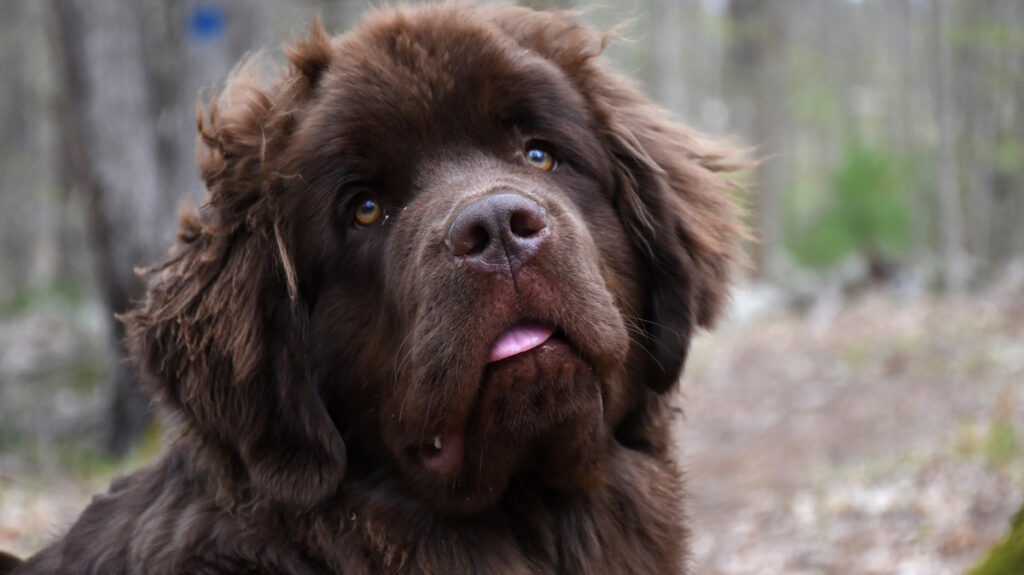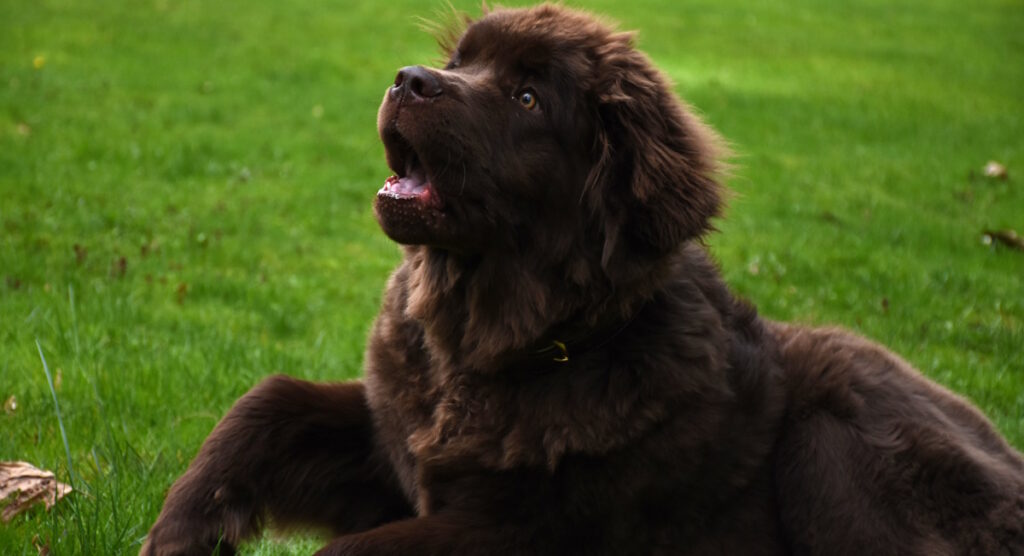As a steadfast ship braving the capricious North Atlantic, the Newfoundland dog is a breed that embodies both the calm and the strength of the sea it’s named after. You’ve likely seen this gentle giant, with its thick, water-resistant coat and soulful eyes, offering a paw in friendship or lying patiently by a child’s side.
Despite their size, Newfoundlands are known for their sweet disposition, but don’t be fooled; they possess a robust work ethic that’s as much a part of their heritage as their love for water. They’re natural-born swimmers, historically bred to haul nets for fishermen and rescue the drowning.
As you consider the traits and temperament of this noble water dog, you’re bound to wonder how such a powerful animal can also serve as a tender-hearted companion. Yet, there’s much more to this breed than meets the eye, and the secrets of their enduring appeal lie just beneath the surface, waiting to be uncovered.
- Noise Level
- Energy
- Sociability
- Trainability
- Care
- Health
Overall
Summary
The Newfoundland breed is known for moderate noise levels, moderate to high energy, high sociability, moderate trainability, moderate care requirements, and generally good health.
Newfoundland: Traits, Temperament, and Care Guide
Embodying a gentle giant’s grace, Newfoundlands are known for their sweet disposition and impressive size, requiring dedicated care and understanding to thrive as part of your family. As pet parents, you’ll appreciate this dog breed’s loyal nature, making them vigilant companions, especially for children.
Their traits include a heavy coat in hues of black, brown, or gray, and despite their size, Newfoundlands possess a laid-back energy level suited for indoor living.
You’ll need to carve out 20-40 minutes daily for exercise to keep them healthy and content. Watch for health issues typical in large breeds, and ensure they get plenty of food during their first year when they can gain up to 100 pounds.
Exploring the Characteristics of the Newfoundland
Newfoundlands typically exhibit a nurturing instinct and robust physique, making them not only imposing figures but also devoted family members. As gentle giants, their friendly nature is matched by their capacity for water rescues, thanks to their webbed feet and love of swimming. Their sweet and gentle demeanor makes them ideal companions, especially in households seeking a large breed with a protective yet affable spirit.
| Trait | Description |
|---|---|
| Size | Large breed, 130-150 pounds, 26 inches at withers |
| Coat | Heavy double coat suited for cold weather |
| Temperament | Sweet and gentle, watchful and trustworthy |
| Exercise Needs | 20-40 minutes daily, enjoys swimming |
| Special Attributes | Webbed feet for swimming, alert to fire |
Their double coat requires regular grooming but offers protection against harsh climates. Ensure you’re ready for their rapid growth and potential health issues.
Newfoundland: A Comprehensive Profile and Guide
As you consider welcoming a Newfoundland into your life, it’s essential to grasp the full spectrum of this breed’s characteristics.
They’re not just gentle giants; their need for regular exercise and spacious living conditions must be factored into your daily routine.
Understanding their protective nature and compatibility with children will help you gauge if a Newfoundland is the right fit for your family dynamic.
Everything You Need to Know
If you’re considering bringing a Newfoundland into your home, it’s essential to delve into their comprehensive profile and guide to understand this gentle giant’s needs and characteristics.
As family dogs, Newfoundlands need:
- Daily interaction with water, harnessing their innate swimming abilities.
- Vigilance for health problems like hip dysplasia and elbow dysplasia.
- A generous amount of exercise to maintain their sweet disposition.
- Special care during cold winter months due to their heavy coat.
- Attention to diet, especially in their fast-growing first year.
The Newfoundland, known as the gentle water dog, thrives in a loving environment that respects its physical needs and monitors its health. It’s a perfect fit for families seeking a protective yet kind companion.

Discovering the Temperament
Delving into the temperament of these gentle giants, you’ll find their trustworthiness and patience make them ideal companions for families with children. Newfoundlands, affectionately known as the gentle water dog, are the epitome of a nanny dog, showcasing nurturing and protective traits. Originally bred as working dogs, they carry an instinct to be helpful, translating into a loyal and service-oriented family member.
You’ll observe that they’re good with kids, displaying a calm demeanor that makes them trustworthy protectors and playmates. While they might bark at strangers, it’s often out of a sense of duty rather than aggression.
Remember that a Newfoundland’s thick fur requires regular grooming, and a balanced diet is crucial to ward off common breed-related health issues.
Newfoundland: Is It a Good Fit for Families?
You’re looking for a furry addition to your family, and Newfoundland’s reputation for gentleness with kids is appealing. Remember they’ll need ample space to roam and a good deal of grooming, so they’re best for families ready for commitment.
Consider their needs and your lifestyle carefully to ensure that Newfoundland is the perfect match for your household.
Assessing Newfoundland’s Compatibility with Families and Kids
Assessing Newfoundland’s compatibility with family life, it’s clear that their gentle nature and love for children make them an excellent choice for households with kids. This Newfoundland breed is well-suited for family environments, offering affection and loyalty. Here’s why they’re a great fit:
- Protective Nature: Adds an extra layer of security.
- Sweet Disposition: Ensures a harmonious relationship with everyone.
- Moderate Exercise Needs: Matches well with varying family energy levels.
- Obedience Training: Encourages a well-behaved family companion.
- Health Considerations: Maintaining a healthy weight to avoid certain health issues.
You’ll find that Newfoundlands offer a great deal of love and require families to spend time on exercise and training, ensuring a happy, well-adjusted pet.
Newfoundland Climate Versatility
The Newfoundland dog is remarkably resilient, thriving in the biting cold and damp conditions due to its protective double coat. Newfoundlands often exhibit an impressive size, yet they carry a rich history from the island of Newfoundland, where they hauled carts and sleds. These large dog breeds require regular grooming to maintain their coat’s condition, and it’s worth considering a professional groomer during shedding season.
Cold times don’t deter them; they’re built for winter adventures. Whether you live in a snowy retreat or a rainy coastal town, their love for water and ability to withstand chilly temperatures make them adaptable companions. Their endurance in varied climates speaks to a lineage fine-tuned for both land and water, ready to belong in your life’s diverse settings.
Newfoundland Obedience Tips
To guide your Newfoundland toward being a well-mannered companion, you must employ effective training strategies emphasizing consistency and patience.
Start your pup’s obedience training early, using positive reinforcement to reward good behavior and establish a strong foundation.
Effective Training Strategies
Harnessing the gentle nature of the Newfoundland through effective training strategies is essential for fostering a well-mannered companion. Begin dog training with your Newfoundland puppy early to ensure your dog develops sociable behaviors. Consistency in your approach will make friends out of strangers rather than fostering aggression toward them.
Provide enough exercise through daily walks and playtime. Chew toys can keep their strong jaws busy, preventing destructive habits. And remember, short, engaging sessions are more effective than long, tedious ones.
To evoke the warmth of a Newfoundland’s companionship and the joy of training, consider the following:
| Positive Moments | Training Milestones | Emotional Rewards |
|---|---|---|
| First ‘sit’ command | Mastering ‘stay’ | Unbreakable bond |
| Joyful daily walks | Consistent recall | Trust and reliance |
| Sharing chew toys | No aggression | Peaceful coexistence |
Effective training strategies create a harmonious home and a lifetime of loyalty.

Exercise and Grooming Needs
Newfoundlands require a balanced blend of physical activity and attentive grooming to maintain health and happiness. As a large breed recognized by the American Kennel Club, they have specific exercise and grooming needs.
Daily walks or playtime at the dog park, paired with a refreshing swim, provide the 20-40 minutes of activity they need to stay fit and prevent health issues associated with being overweight.
Regular brushing, about two to three times a week, helps remove dead hair and keeps their coat healthy. Regular bathing every one to two months will keep your Newfoundland looking and feeling their best.
Health Considerations
You should know Newfoundlands are prone to specific health issues, including Addison’s Disease and joint-related conditions like Subvalvular Aortic Stenosis.
It’s crucial to balance their exercise to support their well-being while being mindful not to overburden their developing skeletal structure.
Monitoring their rapid growth phase carefully can help extend their lifespan and maintain their quality of life.
Common Health Issues and Lifespan
When considering a Newfoundland dog, it’s important to know their average lifespan of 8-10 years and potential health issues like hip dysplasia, elbow dysplasia, cystinuria, and subvalvular aortic stenosis.
As a gentle water dog, the Newfoundland is a member of a breed with a storied history. While you might dream of owning a famous Newfoundland, remember that these loving giants require careful attention to their health.
The Newfoundland Club of America can provide resources on responsible breeding dogs to minimize common health issues. Practice diligent flea and tick prevention and explore treatment options with your vet for any health concerns.
As part of your family, you’ll want to ensure your Newfoundland enjoys the fullest life possible, surrounded by love and proper care.
Alternatives for Newfoundland: Gentle and Loving Giant Breeds
Explore these breeds if you appreciate the Newfoundland’s gentle nature and loving demeanor, perfect for those who value calm and nurturing giant dogs.
| Similar Dogs | Short Description |
|---|---|
| Saint Bernard | A large working dog, famous for its rescue instincts and gentle temperament. |
| Leonberger | Known for its combination of strength and gentleness, great as a family companion. |
| Bernese Mountain Dog | Renowned for its strength, calm demeanor, and loyalty. |
| Irish Wolfhound | A gentle giant among dog breeds, known for its large size and kind nature. |
| Great Pyrenees | Known for its protective nature and calm, patient temperament. |
Is Newfoundland the Right Dog for You?
Considering a Newfoundland means assessing whether your home and lifestyle can accommodate their considerable size and exercise needs. This gentle water dog has traits that demand space and a fondness for swimming. If you’re not ready to handle the grooming and feeding requirements, or to provide access to water for their happiness, this breed may not be the right dog for you.
Newfoundlands have a protective temperament yet devoid of dog aggression, making them ideal for families seeking a gentle giant. Before deciding, visit a shelter or rescue group to understand their needs firsthand. If you desire a companion that embodies loyalty and calmness, and you’re equipped for the responsibility, a Newfoundland could be the perfect addition to your family.
Conclusion
So, you’re considering a Newfoundland, the sofa-sized ‘lapdog’ with a heart as vast as the ocean.
Ready to enjoy a blizzard of fur during shedding season and the drool that’s part of the package?
While they may just outswim you and save your life in the water, don’t expect a jogging partner who’s up for a marathon.
Embrace the quirks, and you’ll have a devoted, fluffy family member who’s the epitome of a gentle giant.
